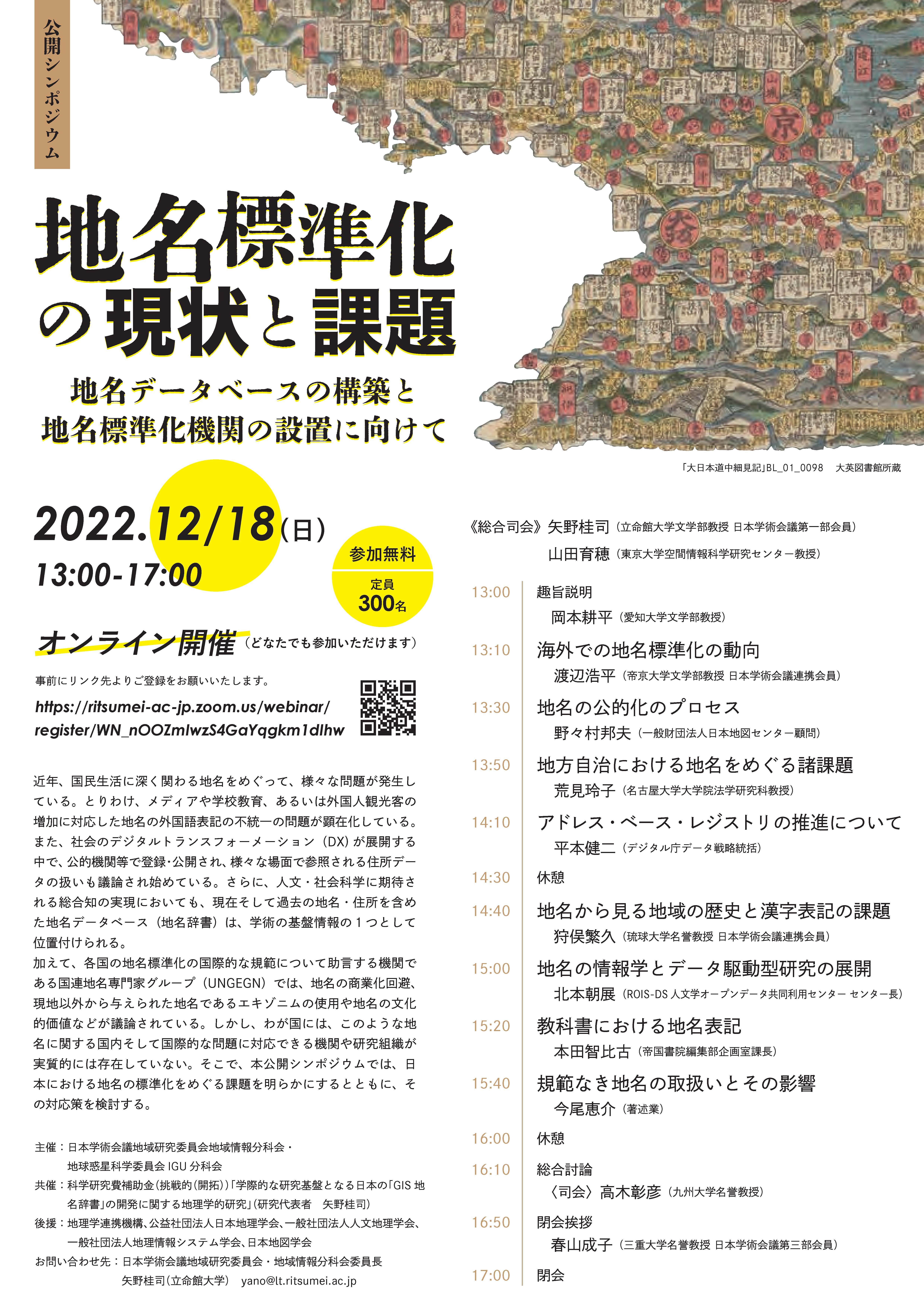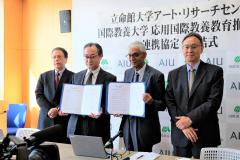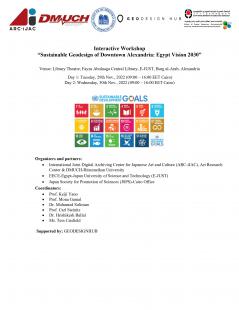-
 10
11
12
13
14
15
16
17
18
19
20
10
11
12
13
14
15
16
17
18
19
20
 [イベント情報]January 20, 2023(Fri)
[イベント情報]January 20, 2023(Fri)We are pleased to announce the Call for Manuscript Submissions for the Art Research Center's journal ART RESEARCH vol. 24.
As an academic journal specializing in arts and culture, the purpose of ART RESEARCH is to widely publicize the results of the research projects and activities conducted by the Art Research Center (ARC), Ritsumeikan University, and its partner institutions and collaborative researchers.
Since its establishment in 1998, the Art Research Center (ARC) has been selected for several national grants as a center of excellence for research in culture, art, and information science. In FY2019, the center assumed the role as the International Joint Digital Archiving Center for Japanese Art & Culture (ARC-iJAC) upon its accreditation by the MEXT as an International Joint Usage/Research Center. The ARC is highly regarded as a leading hub for the digital archiving of Japanese art and culture.
Our online journal will be published several times a year, and at the end of the fiscal year, a print booklet compiling all contributions will be distributed, as we hope to increase the submission opportunities for researchers.
We look forward to receiving your manuscript.
Read more>>[イベント情報]January 18, 2023(Wed)The 114th International ARC Seminar will be held as a Webinar on Wednesday, January 18, from 18:00 JST.
The program is as follows:
1. Session
Speaker: Nozomu ATAKA (Ph.D. Candidate, Graduate School of Letters, Ritsumeikan University)
Topic: The Reality of Temples and Shrines in Nara in the Late Edo Period, Seen from Neifu kiji, a Diary of Kawaji Toshiakira, a Magistrate of Nara
2. Session
Speaker: Shiori Totsuka (Ph.D. Candidate, Graduate School of Letters, Ritsumeikan University)
Title: On Some Problems of Censor's Seals as Seen in the Katsukawa School's Ukiyo-e
Date: Wednesday, January 18, 18:00 - 19:30 JST
Participation: online via Zoom, free of charge (no reservation required)
*This Webinar is open to everyone, and non-ARC members are also invited to participate via YouTube.
[イベント情報]December 26, 2022(Mon)The application for FY 2023 International Joint Research with Research Fund is open until January 20 (Fri), 2023, 5PM (JST). Successful projects will receive research funds from the ARC-iJAC.
Learn more about the application here.
Read more>>[イベント情報]December 18, 2022(Sun)Professor Keiji Yano, Deputy Director of the Art Research Center (ARC), Ritsumeikan University, will serve as chair for the public symposium 'Current Status and Issues of Place Name Standardization: Toward the Establishment of a Place Name Database and a Place Name Standardization Organization', organized by the Science Council of Japan.
Date: December 18 (Sun), 2022, 13:00-17:00 JST
Participation: Online
Anyone is welcome to attend (registration required).[イベント情報]December 13, 2022(Tue)The Art Research Center (ARC), Ritsumeikan University, is pleased to announce the conclusion of a Memorandum of Understanding (MoU) with Akita International University (AIU), a leading institution in international liberal arts education in Japan.
On November 28, 2022, a signing ceremony for the MoU was held at Akita International University and attended by Professor Ryo Akama (College of Letters), Director of the ARC, and Professor Koichi Hosoi (College of Image Arts and Sciences), Deputy Director of the ARC.
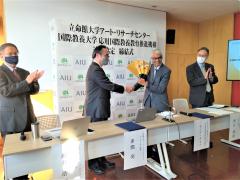
Akita International University was represented by Professor Monte Cassim, President of AIU, and Professor Yoshitaka Kumagai, Vice President of AIU. As former President of Ritsumeikan Asia Pacific University (APU) and former Vice-Chancellor of the Ritsumeikan Trust, Professor Cassim has been pivotal in bringing about this partnership.
The MoU provides a stable framework to advance collaborative projects in digital humanities, in particular, with regards to the building of a digital archive database of materials related to traditional art and culture of the Tohoku region by integrating AIU's Akita Folkloric Performance Art Archives in the ARC Portal Database System--hence, facilitating the dissemination of such materials worldwide.
The Akita Folkloric Performance Art Archives comprise audiovisual records of more than 300 folkloric performance arts in Akita Prefecture held by AIU.
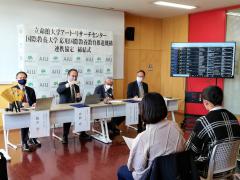
In addition, the MoU shall strengthen academic research on both sides through the organization and participation in joint research programs and events as well as the exchange of researchers from both institutions.
Following the signing ceremony, a round-table discussion was held, where Professor Kumagai introduced the Akita Folkloric Performance Art Archives and Professor Akama explained how the integration of the archives into the ARC Portal Database System worked. Furthermore, both parties shared their thoughts on preserving Japanese cultural heritage.
Official website of Akita International University (AIU): https://www.aiu.ac.jp
The Akita Folkloric Performance Art Archives: https://www.akita-minzoku-geino.jp/archives/
Art Research Center (ARC) databases: https://www.arc.ritsumei.ac.jp/e/database/
[イベント情報]November 29, 2022(Tue)The interactive workshop 'Sustainable Geodesign of Downtown Alexandria: Egypt Vision 2030' will be co-organized by the International Joint Digital Archiving Center for Japanese Art and Culture (ARC-iJAC), Art Research Center, Ritsumeikan University.
Venue: Library Theatre, Fayza Abulnaga Central Library, E-JUST, Burg al-Arab, Alexandria
Day 1: Tuesday, 29th Nov., 2022 (09:00 - 16:00 EET Cairo / 16:00 - 23:00 JST)
Day 2: Wednesday, 30th Nov., 2022 (09:00 - 16:00 EET Cairo / 16:00 - 23:00 JST)For inquiries, please contact: r-darc@st.ritsumei.ac.jp.
Click here for the agenda. ⇊
[イベント情報]November 14, 2022(Mon)The International Joint Digital Archiving Center for Japanese Art and Culture (ARC-iJAC), Art Research Center, Ritsumeikan University, presents:
Training Course to Decipher Japanese Cursive Script (Kuzushiji) with the ARC Transcription Support and Archiving System
<Tutor guidance provided>
We are pleased to announce that the Training Course for the ARC Transcription Support and Archiving System for Japanese Cursive Script (kuzushiji) with tutor guidance, which was well received last year, will be resumed.
This training course will be conducted online using the ARC databases of early Japanese books, ukiyo-e and old documents, as well as the ARC Kuzushiji Transcription Support and Archiving System, allowing participants to practice reading kuzushiji anytime, anywhere, and at their own pace. Features include an AI-enabled function to read kuzushiji and online guidance provided by experienced tutors.
Unlike one-off courses, you can advance your transcription skills as you read through the books and materials independently.
We welcome applications from beginners and intermediate-level participants, as well as those who wish to improve specific transcription projects.
Participation is free of charge.
This training course is supported by the Consortium for Global Japanese Studies.
If you would like to participate, please apply using the form below.
↓↓↓
Application formApplication is closedDeadline: November 22 (Tues), 2022, 12:00 JST
[Details of the Training Course]
Period: December 1, 2022, to March 15, 2023
Language of Instruction: Japanese
Target:
1. Beginners to intermediate level users who would like to transcribe documents written in kuzushiji (capacity: 25 people)
2. Individuals and groups who would like to improve their own projects using the ARC Kuzushiji Transcription Support and Archiving System (individual correction is not provided, but consultation for difficult-to-read characters is available. Capacity: 5 people)
[Schedule]
11/25 Notice of acceptance (tentative)
11/30 Kick-off seminar at 20:00 Japan Standard Time (online/ video on demand available)
- Keynote speaker: Motoi KATSUMATA (Associate Professor, Meisei University, Tokyo)
- Explanation of the course outline and system, introduction of tutors, etc.
12/4 1st System training session (online)
- Session A (from 9:00 JST), Session B (from 20:00 JST)
* We plan to hold several system training sessions during this period.
The closing meeting will be held in late March 2023.
Inquiries:
Office of the International Joint Digital Archiving Center for Japanese Art and Culture (ARC-iJAC)
Art Research Center (ARC), Ritsumeikan University
Contact persons: Sekiguchi, Emily, Kubo
E-mail: r-darc@st.ritsumei.ac.jp
Tel.: +81 75-465-8476 (ext. 2825)
[イベント情報]November 10, 2022(Thu)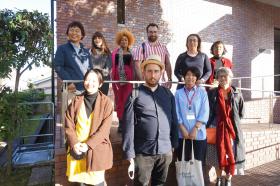 On November 4, 2022, the Art Research Center (ARC) welcomed the research project team of J-InnovaTech--led by Prof. Aleksandra Kobiljski--to an international workshop hosted by the FY 2022 ARC-iJAC international joint research project 'A Digital Archive Connecting Modern Design and Industry: Towards a New History of Machine Textile Printing in Modern Kyoto' (project leader: Aya Ueda).
On November 4, 2022, the Art Research Center (ARC) welcomed the research project team of J-InnovaTech--led by Prof. Aleksandra Kobiljski--to an international workshop hosted by the FY 2022 ARC-iJAC international joint research project 'A Digital Archive Connecting Modern Design and Industry: Towards a New History of Machine Textile Printing in Modern Kyoto' (project leader: Aya Ueda).Prof. Kobiljski is a researcher affiliated with the French National Centre for Scientific Research (CNRS) and director of the Centre de recherches sur le Japon at the École des hautes études en sciences sociales (EHESS) as well as deputy director of the UMR Chine-Corée-Japon (CCJ-EHESS).
Currently, she is conducting the J-InnovaTech project 'Beyond Eureka: The Foundations of Japan's Industrialization, 1800-1885', which was awarded a European Research Council (ERC) Starting Grant in 2018.
The international workshop was chaired by Prof. Keiko Suzuki, Deputy Director of the Art Research Center (ARC). During the workshop, researchers from both sides exchanged opinions on the history of the textile industry in Kyoto in the 19th century and discussed future research cooperation.
Event information
Date: November 4 (Fri), 15:20-19:00
Place: Soshikan SO405, Kinugasa Campus, Ritsumeikan University, Kyoto
Organizer: International joint research project 'A Digital Archive Connecting Modern Design and Industry: Towards a New History of Machine Textile Printing in Modern Kyoto' (「新しい近代京都機械捺染史構築に向けて―近代デザインと産業史をむすぶデジタル・アーカイブを一助として―」), adopted by the International Joint Digital Archiving Center for Japanese Art and Culture (ARC-iJAC)/ Project leader: Aya Ueda (Part-time Lecturer, Kwansei Gakuin University and Doshisha Women's College of Liberal Arts)
Co-organizer: International Joint Digital Archiving Center for Japanese Art and Culture (ARC-iJAC), Art Research Center, Ritsumeikan University
Please note that this was a non-public event.
 With the establishment of the International Joint Digital Archiving Center for Japanese Art and Culture (ARC-iJAC) in 2019, the Art Research Center strives to push the internationalization of research activities that transcend disciplines and geographic boundaries.
With the establishment of the International Joint Digital Archiving Center for Japanese Art and Culture (ARC-iJAC) in 2019, the Art Research Center strives to push the internationalization of research activities that transcend disciplines and geographic boundaries.NEWS
 The ARC received the Digital Archive Japan Award (DAJ) 2022 on Aug.25
The ARC received the Digital Archive Japan Award (DAJ) 2022 on Aug.25
The ARC is enormously honored to be one of the first recipients of the Digital Archive Japan Award (DAJ).
The DAJ is an award system newly established by Japan Search, a platform operated by the National Diet Library, for aggregating metadata of digital resources. Regarding this award, Prof. Ryo Akama, Director of the ARC, expressed:
Regarding this award, Prof. Ryo Akama, Director of the ARC, expressed:
"The ARC faculty would like to take this award as an opportunity to further respond to the needs of users worldwide by disseminating information on cultural resources in Japan which go beyond areas such as ukiyo-e, early Japanese books, and banzuke-related contents."
As a curator at the Prince Chichibu Memorial Sports Museum, Murakami is leading a joint research project with the ARC on digital-archiving the extensive collection of sports materials of the museum in cooperation with the ARC. 
She also reflects on her internship experience at UC Berkeley, facilitated by the ARC, while she was a graduate student at Ritsumeikan University. >>Read full interview. 
Prof. Hosoi took on a pioneering role when he founded the Game Archive Project (GAP)--a collaboration between Nintendo, Kyoto Prefecture, and Ritsumeikan University. 
In the interview, Prof. Hosoi reflects on the early days of his game research and discusses the social impact of games, the acceleration of the metaverse amid COVID-19, and future directions for game research. 
 On August 21, 2022, ARC faculty member Prof. Satoshi Tanaka (College of Information Science and Engineering, RU) presented the research outcomes of his project on the ultra-high-quality see-through 3D visualization of Taimadera Temple at a roundtable event, held as part of its special exhibition 'Researching Cultural Heritages' at the Nara Prefecture Historical and Artistic Culture Complex. >>Read more.
On August 21, 2022, ARC faculty member Prof. Satoshi Tanaka (College of Information Science and Engineering, RU) presented the research outcomes of his project on the ultra-high-quality see-through 3D visualization of Taimadera Temple at a roundtable event, held as part of its special exhibition 'Researching Cultural Heritages' at the Nara Prefecture Historical and Artistic Culture Complex. >>Read more.
Mikiharu Takeuchi took home top honors at the award ceremony for the 11th Young Scholar Award sponsored by ESRI, a major geographic information system (GIS) software company based in the US. 
Takeuchi is a doctoral student at the Graduate School of Letters and is supervised by Prof. Keiji Yano, Deputy Director of the ARC. >>Read more. [Video available] Prof. Koichi Hosoi & Prof. Keiji Yano Presented Research Activities at the WEB 3.0/ Metaverse Study Meeting
The WEB 3.0/ Metaverse Study Meeting was held by Kyoto Chiesangyo Sozonomori on August 29, 2022.
Prof. Hosoi (College of Image Arts and Sciences, RU) held a keynote speech on the next-generation internet world as seen through the XR/ metaverse. Prof. Yano (College of Letters, RU) presented his research with the case study on the construction of Virtual Kyoto using GIS. >> Watch full video.


Upcoming Events
November 16 (Wed), 2022, 18:00-19:30
110th International ARC Seminar
Speaker: Dr. Ellis TINIOS (Honorary Lecturer in History, School of History, University of Leeds, UK)
Topic: 'After native drawings': the books that introduced nishiki-e and ehon to Western audiences: Narrative of the Earl of Elgin's Mission to China and Japan (1859) and Japanese Fragments (1861).November 19 (Sat) - December 19 (Mon)Special Exhibition
Kamigata no Chūshingura Ukiyo-e
Ako City Museum of History
(co-organized by Art Research Center, Ritsumeikan University)
Details: http://www.ako-rekishi.jp/guide-planning/




Previous issues:
Summer 2022, Spring 2022, Winter 2021, Autumn 2021, Summer 2021, Spring 2021, Winter 2020, Autumn 2020, Summer 2020, Spring 2020view this email in your browser Copyright © 2021 Art Research Center, Ritsumeikan University. All rights reserved.
Our mailing address is:
56-1 Toji-in Kitamachi, Kita-ku, Kyoto 603-8577 JAPAN
Want to change how you receive these emails?
You can update your preferences or unsubscribe from this list.The ARC Days were held on Sep 16 (Fri) & 17 (Sat), 2022. It is an annual event where the faculty members of the Art Research Center, Ritsumeikan University, and international collaborative researchers whose projects have been adopted by the International Joint Digital Archiving Center for Japanese Art and Culture (ARC-iJAC) introduce their research projects in Digital Humanities (DH) in individual presentations.
To prevent the spread of COVID-19, this event was held online via Zoom and broadcasted live on YouTube.
Organizer: International Joint Digital Archiving Center for Japanese Art and Culture (ARC-iJAC), Art Research Center, Ritsumeikan University and Program for Supporting Research Center Formation, Ritsumeikan University
Read more>> 10
11
12
13
14
15
16
17
18
19
20
10
11
12
13
14
15
16
17
18
19
20



